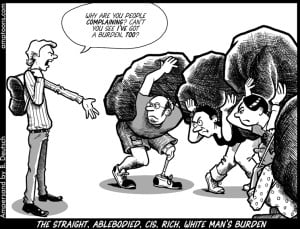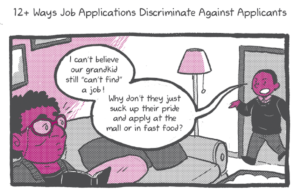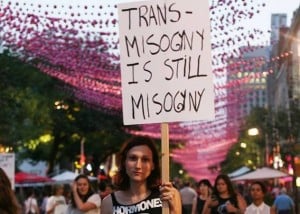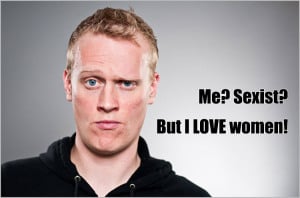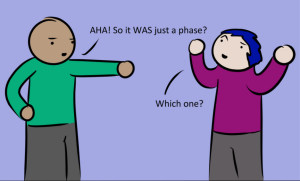I still remember when my dreams as an activist were crushed.
I was about two clicks away from skipping into that favored liberal arts college, confident that they were the key to nurturing my need to become more successful in my activist ways. They were going to open up whole new worlds and modes of thinking for me.
I was so excited when I entered that rare, incredibly (and ironically) elitist program. Man oh man, did I have goals. I felt ready, special, and convinced I’d be able to single-handedly take on the world.
I was going to continue my education in identity philosophies as taught to me in books and conferences by people of all sorts of colors, sexes, genders, orientations, abilities, and sizes.
Fuck yeah!
I was going to use that degree to continue trying to better the world for marginalized people.
Fuck yeah!
I was going to lead rallies, start groups, and use my pristine, infallible logical to once and for all shut down the man.
Fuck yeah!
I was going to sit around each day accumulating massive amounts of debt to an institutional complex solely designed to keep me under its thumb while I wiled away my precious activism hours reading and writing content that didn’t mean shit to those suffering outside of my ivory tower.
Fuck yea—wait, what?
I’m not entirely sure at what moment I became Rapunzel, but the second I realized it, I was horrified.
And then I looked around at my peers. It was disturbing to see every last one of us –each some manner of activist who also identified with some manner of marginalized personhood, given our major – not only having lost our activist ways, but having been duped into thinking we were still doing great things in the world.
Something had happened. We’d changed. The oppression monster had claimed every last one of us in all of its om nom nom glory.
And the more I stared at the disaster I’d help to make, the more I began to see what was harmful with the entire system of college education for us activists.
1. It Breaks Your Connections with Those You Want to Help
Let’s be real: When you’re a full-time student, your priorities shift dramatically. And if you’re also working through college? Yeah. Good luck with that.
It doesn’t matter how badly you want to continue helping people while in school. School will take over your life, whether from the workload, the anxiety of the workload, or charting how to tackle both the anxiety and the workload without compromising your GPA or mental health.
For most students, if you’re not doing something school-related (or paying-off-school-while-in-school-related), you’re sleeping.
And when any “free” time to be an activist is gone, your connections to people you want to help – the outside world – slip away fast. It doesn’t matter if it’s a complete stranger or your close friend; you ain’t gonna be talking to them in matters of substance for long stretches of time.
But is this disconnection the fault of so-called higher education? Not inherently. But that’s not the problem here.
The problem here is what these institutions (and society) do to your poor little brain to keep you from being an activist.
2. It Misleads and Distracts from Your Activism Priorities – And Risks Destroying Them Altogether
So we’ve already covered the basic fact of time loss. Cool. But there’s so much more going on here than three essays due Monday.
The true crux of the time problem falls into two mindsets most students have: 1) the internalized belief that you’re nobody if you don’t have a degree of some sort and 2) the anxiety of paying off student debt.
The college degree is the new high school diploma. Way back yonder, high school diplomas used to be more difficult to obtain, so it was carried around as the golden ticket to a job that (hopefully) paid a livable wage.
But high school has become much more accessible than it was for our grandparents or parents (the white ones, anyway), and now our society of inequality is scrambling for new ways to keep rights to life as unequal as before.
A quick fix was to move up the education ladder and make the next step outrageously more expensive than it used to be. (Made even more difficult since costs of living have also risen without minimum wage being allowed to keep the pace.)
It’s pretty sick.
We’re against inequality, but we’re not taken seriously by the mainstream unless we have a PhD behind our names when we speak out about it (or at least speak eloquently in big, white people words as if we have a PhD behind our names).
We’re led to believe that if we want to make any sort of change in the world, we have to actually pay to pretend to be one of the mainstream for a handful of years, cult-style.
So the scholarly activists get lured in, wrung out, and tossed into hamster wheels where they’ll be stuck in low-paying and/or conservative jobs to pay off debts that can’t be forgiven even in bankruptcy.
Boom. Threat neutralized.
3. It Makes Abstraction Feel Like Reality
Ask any Psych 101 or Pre-Med major and they’ll know exactly what I’m talking about.
Medical books are ultimately abstractions of how real people could be analyzed and cured, but damn if these poor students don’t end up convinced they themselves have everything from paranoid schizophrenia to kidney stones.
Regardless of a student’s liberal arts major, the final thesis is the best example to drive home what I mean.
Say you’re sick of playing nice and really want to shake things up. You want to write something meaningful, something people could take back out into the world and open their eyes to all of the hate that’s going on.
You want to write about how 90s Disney queered its villains as a way of teaching children that gender non-conforming traits are bad. Or how having female-identified scientists throughout history would’ve caused more successful advancements more quickly. Or how Shakespeare ripped off Romeo and Juliet from ancient African lore.
Awesome topics, the lot of them. They’re important things to think about and would be great if they were more widespread. Abstract thought can enlighten you with ideas that could one day help those that are suffering.
But the thesis itself you’re working on isn’t going to hit the outside world. You’re writing a paper. That very few people will have the privilege to see.
Unless they have the freedom and access to be literate, attend school (or any form of education), afford your particular school (or any school), are in your relative field, and need to find research for their own thesis that, in turn, will sit on a single shelf at a singularly exclusive library.
Even if you get the okay to post it online for free (spoiler: you probably won’t), you still may not be able to reach your audience at large. Between the philosophical jargon and political science rhetoric you’ve picked up over your four years, you’re going to lose a lot of readers who haven’t had the same education privileges you’ve had. And they may have other things on their mind – like where their next meal will come from.
It’s easy to think otherwise about how important your thesis is to the world because, well, your world has become a few professors and a classroom of thirty.
But that’s not Real World. That’s College World. You can tell the difference because Real World has way more people in it.
4. It Takes Passive-Aggressive Hate to a Whole New Level
A big problem with the ivory tower is that it tends to encourage and feed off of competition.
Healthy competition is cool, but competition within higher education is frequently anything but. Depending on your field, your very professors may actually be not only encouraging it, but inciting it. And that’s rough. (Think the Harvard Law scenario in Legally Blonde.)
But then there are the times when, for some odd reason, students turn on each other simply for the sake of turning on each other. Sometimes it’s incredibly overt, but when you’re amongst “like-minded peers,” it often boils itself down into passive-aggressive barbs.
There are no blatantly racist comments, but accusations that someone else is racist and we should therefore exclude them. There are no transphobic slurs, but calm, clean arguments in class about why transgender people who transition in a binary way are the scum of the earth. Nobody would dare utter the “R” word, but they’ll debate with a peer who has an invisible disability as to why they should be allowed to appropriate spoon theory for their own needs.
And all the while, professors and staff may encourage this behavior.
Because apparently this is meant to bolster our ability to think critically and argue intellectually, to get used to having logical discussions about real-life problems in the real-life world. But instead of doing just that, they’re turning teachable moments into witch burnings.
It’s like playing Cards Against Humanity with that bigot who’s always dying to get away with being an asshole in the name of frivolity. (“Why are you getting offended? Saying these things is the whole point of this game!”)
But activism isn’t a game. Not to us.
And it sure as hell doesn’t help us out in the real world when we’re stuck in a small, exclusive space built by the mainstream, preserved by the mainstream, and frequently taught by people who have long since lost their way themselves to hate on each other.
Every last one of you in a school situation has the rare and privileged opportunity to swap ideas and thoughts and meet up with people whose identities are like yours (or, at least, allies with mindsets that agree that you shouldn’t be treated like shit).
For many of us, this is a treat beyond imagination.
Don’t sully it by suddenly turning on each other for arbitrary reasons. Don’t turn the very people you need for success into your enemies. Band together so you can actually take over the world.
Keep in mind that if you’re all too busy bickering, you’re never going to achieve anything worthwhile.
Little Ways to Turn Your ‘I’m Fucked’ Into ‘Fuck Yeah!’
So what did I do when I realized I’d become a Rapunzel? I booked it out of there. Once I saw my peers start to turn on one another and form cliques based on their primary identities (God help the intersectional leftovers), I knew there was no future left for me there.
For me, it was a great choice. I ended up with all sorts of experiences that reconnected me to the marginalized sub-worlds that I would have missed out on if I’d stayed in my program. I helped them, and they helped me. Listening to my gut and dropping out turned out to be one of the best decisions I’ve ever made.
Does this mean you should shred your thesis, cuss off the advisor, and drop out of school? Hardly. While leaving was the right choice for me, it was also the right choice for me.
Newsflash: You’re not me. So you have your own decisions to figure.
If you want to stay in school and still feel like an activist, then simply get active in the nonexistent spare time you have. (If you don’t understand how that’s possible, please find the nearest single parent.)
Help out at a soup kitchen. Start a Safe Space on your campus (that’s also open to non-students). Join in a Black Lives Matter march. Educate someone when they say something problematic, whether it be in class or on a sidewalk.
Do what you can to not lose your way and stay an activist while in school. Stay connected to non-college people. Ask for help when you need it. Take breaks. Watch for burnout. Reflect at least twice a semester on why you want to be in school and if you’re getting out of it what you want.
A college education doesn’t have to be a monster. It’s just being made into one. But you still have time to take control of it to the best of your ability, should you choose to accept the mission.
Think about it: They’re at least letting marginalized identities in. That’s a great first step. And if you have the energy and resources to use that to your advantage and start tearing down the system from the inside-out, you’re going to get all sorts of “Fuck yeah!” from the rest of us.
[do_widget id=’text-101′]
James St. James is a Contributing Writer for Everyday Feminism. He works as a transcriber for super-duper secret projects, tends to keep to himself, and is currently pitching a novel that scares agents. He uses his experiences as a way to reach out to others, usually by way of not keeping his mouth shut. When he’s not busy making cis gender people uncomfortable with his trans gender agenda, he likes to play vintage video games and eat candy. You can praise him on Twitter @JamesStJamesVI. Read his articles here.
Search our 3000+ articles!
Read our articles about:
Our online racial justice training
Used by hundreds of universities, non-profits, and businesses.
Click to learn more











